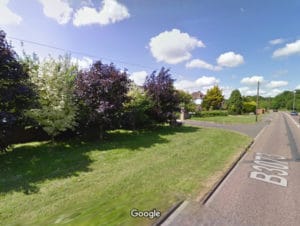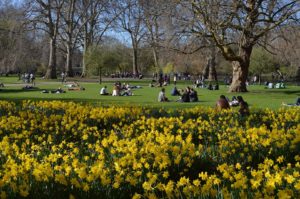Support us from £3/month
We deal with almost 1000 cases a year assisting communities, groups and individuals in protecting their local spaces and paths in all parts of England and Wales. Can you help us by joining as a member?
Through our 154-year history, the Open Spaces Society has developed a proud record of legal action. We fought the enclosures, and defended commoners’ rights; we have tested the law in the courts many times. We have suffered losses, but we also have landmark victories to our name.

Leigh Road Photo copyright: Google
One such victory was our challenge to Dorset Council’s decision to deregister part of Leigh Common to allow development. The council said, wrongly, that as the land was part of the highway it should not have been registered as common.
Unimpressed
We threatened court action and the council backed down, but one of the developers, BDW Trading Ltd (part of Barratt Developments plc), refused to concede. We were granted permission for judicial review by a judge who was ‘unimpressed by the bullying tone of the correspondence from BDW’. A month before the high court hearing BDW, no doubt swayed by the excellent arguments from our counsel, offered to settle.
The point was perhaps arcane and the area of land small, but the result is significant. If Dorset and BDW had succeeded, councils throughout England and Wales would have been encouraged to deregister pieces of highway which had been registered as common land, opening the door to development. We trust that our action has put a stop to that practice.
Nevertheless, local people up and down the country are bullied by developers who want to grab their open spaces. We help where we can but there is often no legal solution.
Once land in England has been identified for development it is too late to record rights of use by registering it as a village green. (In Wales, thanks to our efforts, it is not too late until planning permission is actually granted.) It is therefore vital to identify potential greens before the land is threatened.
Comfort
Some comfort comes from the recent report of the English landscapes review, led by Julian Glover. It calls for the areas of outstanding natural beauty (AONBs), many of which are under great development pressure, to be made statutory consultees in the planning system. We also welcome its proposals for more national parks—first off, the Chilterns, Cotswolds, Dorset, and East Devon AONBs.

London, St James Park Image Pixabay
Without suggesting anything specific, Glover calls for greater links between people and their natural spaces close to home—as demonstrated by the London National Park City. This all helps to show the importance of local green spaces to people’s lives.
The Glover recommendations offer a real step up for England’s landscapes and the ability of people to discover and enjoy them. Government must act on this report.
Kate Ashbrook
